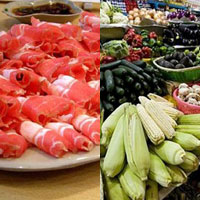|
|

|
|
Men prefer meat, while women like fruits and vegetables
|
Men and women have different tastes in food, with men favoring meat and poultry, and women fruits and vegetables, researchers said in what was touted as the most extensive study to date of gender differences in eating habits.
More than 14,000 adult men and women were surveyed from May 2006 to April 2007, for the Foodborne Disease Active Surveillance Network (FoodNet), to determine their eating habits, including high risk foods such as undercooked meat and eggs.
"It was interesting that there were some differences, and whether those differences are cultural or biological, they're not quite sure," said Beletshachew Shiferaw, a lead researcher on the study.
"To our knowledge, there have been studies in the literature on gender differences in eating habits, but nothing this extensive," the epidemiologist told the 2008 International Conference on Emerging Infectious Diseases in Atlanta, Georgia.
Researchers found that men were more likely to eat meat and poultry, especially duck, veal, and ham, and certain shellfish such as shrimp and oysters.
Women instead were more likely to eat vegetables, especially carrots and tomatoes, and fruits, especially strawberries, blueberries, raspberries and apples.
Women also preferred dry foods, such as almonds and walnuts, and were more likely to consume eggs and yogurt when compared with men.
There were also some exceptions to the eating trends of each gender: men were significantly more likely to eat asparagus and brussels sprouts than women, while women were more likely to consume fresh hamburgers as opposed to the frozen kind, which the men preferred.
And regarding high risk foods, the researchers found that significantly more men consumed undercooked meat and eggs than women, while more women were more likely to eat alfalfa sprouts.
Men's preference for meat explains why men have more cases than women when it comes to high cholesterol, the study said.
(Agencies) |
研究人员日前称,男性和女性对食物的偏好有所不同。男性爱吃肉禽类食物,而女性则更偏爱水果和蔬菜。据称这是迄今为止针对饮食习惯性别差异所进行的最广泛的一项研究。
“食源性疾病监测网”(FoodNet)共对14000多名成年男女的饮食习惯进行了调查,其中包括未煮熟的肉和鸡蛋等高风险食品。该调查从2006年5月持续至去年4月。
该研究的首席研究员Beletshachew Shiferaw说:“有意思的是,我们从调查中发现了一些差异。但目前还不能确定这些差异是文化上的,还是生物学上的。”
这位流行病学家在佐治亚州亚特兰大召开的“2008流行传染病国际研讨会”上说:“据我们所知,此前有文献中提到了一些有关饮食习惯性别差异的研究,但都不如我们的研究广泛。”
研究人员发现,男性更爱吃肉类和禽类,尤其是鸭肉、牛肉和火腿,以及虾、牡蛎等贝类食物。
而女性则更青睐蔬菜和水果,尤其爱吃胡萝卜、西红柿、草莓、蓝莓、酸梅和苹果。
女性还爱吃杏仁和核桃等坚果类食品,此外,与男性相比,她们对鸡蛋和酸奶更感兴趣。
然而从男性和女性的饮食趋势来看,也存在一些例外。如:男性比女性更爱吃芦笋和芽甘蓝,女性更青睐新鲜汉堡,而不是男性喜爱的冻汉堡。
研究人员发现,在高风险食物方面,男性吃未煮熟的肉类和鸡蛋明显多于女性,而女性更爱吃苜蓿芽。
男性对肉类的偏爱可以解释为什么男性高胆固醇的发生率高于女性。
点击查看更多双语新闻
(英语点津姗姗编辑)
|